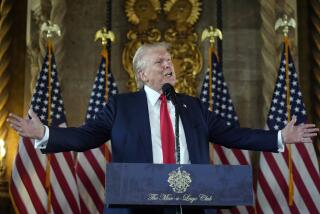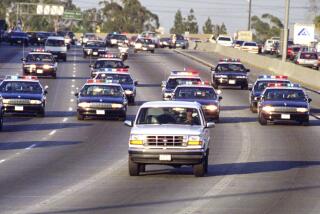D.A.’s Office Hired ‘Focus Group’ in Simpson Case; Acquittal Favored : Courts: Phoenix group made decision based on what they knew at the time. Differing opinions about Clark and Shapiro are offered.
- Share via
To gauge how media coverage of the O.J. Simpson murder case might be affecting potential jurors, a consultant for the prosecution recently queried 17 Phoenix residents about the proceedings and learned that most would acquit the former athlete based on what they knew at the time, according to two members of the group.
Lance Kingston, a 33-year-old real estate agent, said in an interview that about a dozen participants said they would not convict Simpson. Kingston said he was one of three or four members who said they could not decide.
“I told them I couldn’t find him guilty based on what I knew, but that I didn’t know if he was scot-free innocent either,” Kingston said.
Among other things, most of the 17 men and women indicated that they were put off by Deputy Dist. Atty. Marcia Clark and charmed by one of Simpson’s lead defense lawyers, Robert L. Shapiro.
When asked to give a one-word description of Clark, Kingston said, most of the group members used negative terminology. He said some of the words used were pushy and aggressive . Words used to describe Shapiro, Kingston said, were smooth , chutzpah and sharp .
The participants also said they were suspicious of Los Angeles Police Detective Mark Fuhrman, who has testified that he found an incriminating bloody glove at Simpson’s estate.
The responses, Kingston said, were based on what he and the 16 others knew about the case from news reports, with only a few facts provided by the questioners. The six-hour session was held Aug. 19 at a Phoenix hotel.
The district attorney’s office confirmed Thursday that the “focus group” took place, but said in a statement that “no verdicts or ballots” were taken. The statement said the group was put together to assess “attitudes created by the media coverage of the case.”
A law enforcement source who did not want to be identified said prosecutors also wanted to find out attitudes toward “certain evidence and personalities.”
Kingston confirmed that no written ballots were taken, but he insisted that people were verbally polled about the verdict they would return. His account was confirmed by another member of the group, Charles Scruggs, a Phoenix truck driver.
Simpson has pleaded not guilty to the June 12 murders of his ex-wife, Nicole Brown Simpson, and her friend Ronald Lyle Goldman in a case that has attracted unprecedented media attention.
Milton Grimes, a Santa Ana-based lawyer who has used focus groups in his cases, said the outcome of the session in the Simpson case does not necessarily bode ill for the prosecution.
“Anytime you do something that gives you feedback on the weaknesses in your case, it helps you,” he said.
Focus groups are most often used by corporations in civil cases, because few others can afford the expense, Grimes said. Other legal experts said it was rare for the government to employ such a strategy for that reason.
Dist. Atty. Gil Garcetti, smarting from hung juries in the Menendez brothers murder trial, said this year that his office would increasingly turn to outside experts in preparing for high-profile trials.
His office hired Decision Quest, a Torrance-based jury consultant firm, to aid prosecutors in the Simpson case. The company that conducted the session in Arizona was the Phoenix-based Response Research, said Kingston, who believes he and the other participants were chosen at random. They were paid $125 each, he said.
When he agreed to take part in the session, he did not know it was for the Simpson case, he said. He found out only after he and the other group members had arrived at the hotel on a Saturday morning, he said, and filled out “20 or 30” forms that asked general questions about his attitudes.
“They presented a multitude of questions, racial questions about if we thought the cops acted properly,” Kingston said.
When asked if they thought the case has racial overtones because Simpson is black, most of the group members--there were nine blacks and eight whites--said they did not, Kingston said.
More to Read
Sign up for Essential California
The most important California stories and recommendations in your inbox every morning.
You may occasionally receive promotional content from the Los Angeles Times.













